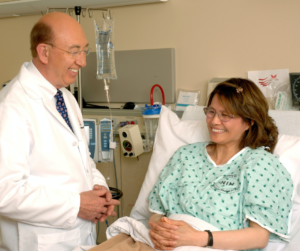Megan B May, PharmD, BCOP & Jeannie Patrick, PharmD, BCOP
In 2020, the US Food and Drug Administration (FDA) announced approximately 28 new oral anticancer drug approvals and expanded indications for currently available oral anticancer products on the market.1 This expanding area of oncology requires counseling, financial navigation, education, and follow-up as well as frequent monitoring for adherence, adverse effects, and drug-drug interactions. Pharmacists are specially trained in all aspects of medication therapy and should play an integral role in managing patients receiving oral chemotherapy.
At Baptist Health Lexington, a pharmacist-run Oral Chemotherapy Clinic was established in 2017, staffed with a full-time PGY-2 trained oncology pharmacist and financial navigator. Patients enrolled in the clinic received education on medication administration and adverse drug reaction management, monitoring of out-of-pocket (OOP) costs, assistance with financial assistance documents, and medication compliance follow-up. We have had the pleasure of developing this clinic with full support from hospital management, oncologists, and nursing staff. Since the implementation of the Oral Chemotherapy Clinic, we have enrolled over 1,290 patients and currently follow 408 patients with active specialty prescriptions for an oral oncologic agent.
Benefits of oral oncologic therapy over traditional intravenous therapy include ease of administration, convenience of use, and decreased invasiveness. Unfortunately, treatment with new oral oncologic agents routinely costs more than $100,000 per year, leading to the potential for significant financial burden for these patients.2, 3 Insurance companies routinely place oral oncologic agents in specialty tiers, resulting in significant OOP costs. As a result of unmanageable prescription cost, concern for delays in initiation and abandonment of treatment exist for cancer patients prescribed oral chemotherapy. In 2018, the Journal of Clinical Oncology published an article examining the association between OOP costs and oral chemotherapy prescription abandonment. The results of the study revealed higher OOP costs (> $2,000) were associated with higher rates of abandonment (49.4%).4 At Baptist Health Lexington, we conducted a similar chart review study that included 150 patients. The overall incidence of prescription abandonment was 8.7%. Abandonment rates were higher in patients with greater initial OOP costs (2.1% for ≤ $10; 8.7% for $10.01 – $500; 10% for $500.01 – $1,000; 0% for $1,000.01 – $10,000; 12.5% for > $10,000). Of those with an initial OOP cost greater than $2,000, there was an 8.6% rate of prescription abandonment. The overall incidence of treatment delay was 2.6%.
The minimization of abandonment rates, as well as decreased incidence of treatment delays compared to that reported in the literature, supports the utility of a pharmacist-led Oral Chemotherapy Clinic at our local institution. Patients are initially referred to the Oral Chemotherapy Clinic by the oncologist after a treatment plan with an oral chemotherapy agent has been entered into the electronic medical record. Once the referral has been generated, the clinic then assumes responsibility for ordering the medication, completing any needed prior authorizations and appeals, obtaining patient financial assistance, providing initial education, and following up with patients throughout the course of treatment. These services help to eliminate potential barriers to treatment and provide an additional support structure for managing patients on oral chemotherapy within the cancer center, promoting the profession of pharmacy and directly impacting the patients we care for.
- U.S. Food & Drug Administration. Hematology/oncology approvals & safety notification. Available at: https://www.fda.gov/drugs/resources-information-approved-drugs/hematologyoncology-cancer-approvals-safety-notifications. Accessed on May 28, 2021.
- American Society of Clinical Oncology (ASCO). ASCO Position Statement on Addressing the Affordability of Cancer Drugs. 2017. https://www.asco.org/sites/new-www.asco.org/files/content-files/advocacy-and-policy/documents/2017-ASCO-Position-Statement-Affordability-Cancer-Drugs.pdf. Accessed August 18, 2020.
- Carrera PM, Kantarjian HM, Blinder VS. The financial burden and distress of patients with cancer: understanding and stepping-up action on the financial toxicity of cancer treatment. CA Cancer J Clin. 2018; 68(2):153–165.
- Doshi JA, P LI, Huo H, et al. Association of patient out-of-pocket costs with prescription abandonment and delay in fills of novel oral anticancer agents. J Clin Oncol. 2018; 36(5):476-482.

Jeannie Patrick, PharmD, BCOP
Clinical Oncology Pharmacy Specialist – Baptist Health Lexington

Megan B May, PharmD, BCOP
Clinical Oncology Pharmacy Specialist – Baptist Health Lexington







